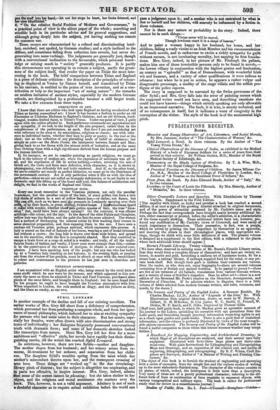SYBIL LENNARD
Is another example of the decline and fall of our existing novelists. The earlier works of Mrs. Grey fell short from a deficiency of comprehension, which prevented her from producing a complete whole, and from her igno ranee of moral philosophy, which induced her to aim at exciting sympathy for persons who had some taint in their character. But her actors, espe- cially her females, were often drawn with' nice discrimination and strong traits of individuality ; her dialogues frequently possessed conversational truth with dramatic force ; and some of her domestic sketches looked like transcripts from nature. Since Mrs. Grey left her first for a more ambitious and "effective" style, her novels have rapidly lost their distin- guishing merits, till the writer has reached Sybil Lennard. In strictness, however, there are two Sybils—mother and daughter. The mother elopes from her husband ; and her misery arises from re- morse, ill-treatment by her seducer, and separation from her child- ren. The daughter. Sybil's troubles spring from the taint which her mother's misconduct throws upon her, and the, consequent crossing of true love. These things are "worked up" to the due circulating- library pitch of distress ; but the subject is altogether too unpleasing, and in parts too offensive, to inspire interest. Mrs. Grey, indeed, admits that some of the scenes cannot be plcasizty ; but she takes shelter in her object, and the religious and moral sentiments she scatters over the book. This, however, is not a valid argument. Adultery is not of such a doubtful character as to require actual exhibition before the world can pass a judgment upon it ; and a mother who is not restrained by what is due to herself and her children, will scarcely be influenced by a fiction in three volumes.
Nor is there any nature or probability in the story. Indeed, there cannot be in such things— "Virtue never will be moved,
Though lewdness court it in a shape of heaven."
And to paint a woman happy in her husband, her home, and her children, falling a ready victim to an Irish Member and his recommendation of French novels, and to endeavour to excite a sickly sympathy for guilt without excuse, is not inculcating morality, but sapping its first founda- tions. Mrs. Grey, indeed, in her picture of Mr. Fitzhugh the gallant, makes him one of those irresistible persons only to be found in novels,— the lowest villany in conjunction with the highest genius and fascination,' an oratory as " splendid " as that of Demosthenes, with wonderful Irish wit and humour, and a variety of other qualifications it were tedious to rehearse: but when he is put in action, he appears a rather vulgar and disagreeable personage, a medley of the stage villain and the selfish pro- fligate of the police reports.
The story is supposed to be narrated by the Swiss governess of the elder Sybil ; and Mrs. Grey falls into the error of painting scenes which the supposed writer could not have seen, and describing emotions she could not have known—things which strictly speaking are only allowable in an impersonal narrative. The fault, it is true, is merely technical, and of no consequence in itself, but it indicates a want of congruity in the conception of the writer. The style of the book is of the sentimental high pitch.


























 Previous page
Previous page